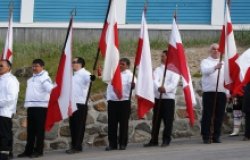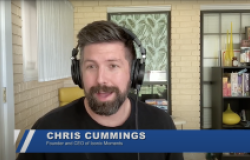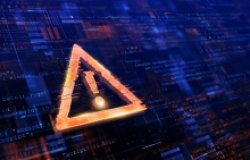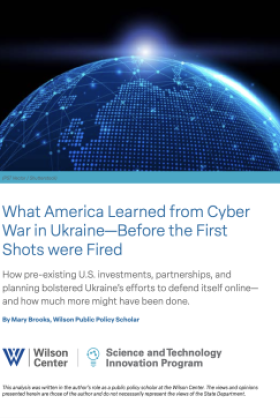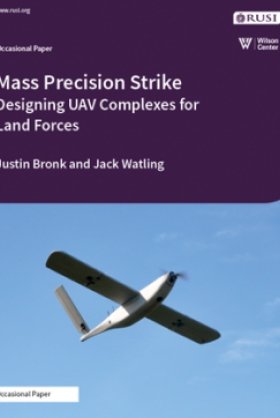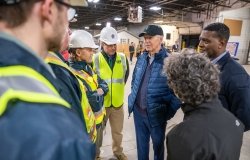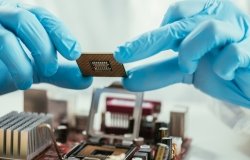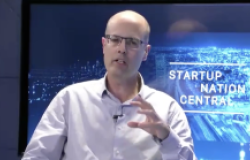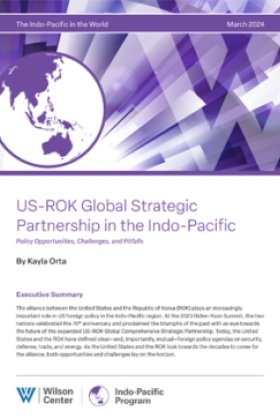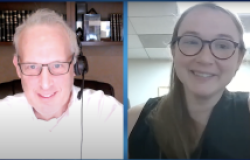Greenland-US Research Cooperation: Exploring a New Model for Research in Greenland
The Greenland Representation in Washington DC and the Wilson Center's Polar Institute and Global Europe Program hosted another session in the Greenland Dialogues. Experts discussed the findings and recommendations of a National Science Foundation workshop that explored ways to strengthen and enhance research collaborations between the U.S. and Greenland.
Overview
A Greenland Dialogues Event
Greenland's environment is rapidly changing as sea ice melts and glaciers crumble, and the effects of climate change are plain to see. While this has attracted scientists from around the globe for decades, Greenlandic society has seen few direct benefits of this increasing focus. Greenlandic and American research institutions now seek stronger bilateral relations that leverage the resources and expertise of researchers, and capacity building and better inclusion of stakeholders and community members. Collaboration between Greenland and the U.S. can yield better research, consider more diverse perspectives, articulate the benefits of research to Greenlandic society, and train the next generation in this framework.
The Greenland Representation in Washington DC and the Wilson Center's Polar Institute and Global Europe Program hosted another session in the Greenland Dialogues. Experts discussed the findings and recommendations of a National Science Foundation workshop that explored ways to strengthen and enhance research collaborations between the U.S. and Greenland.
Selected Quotes
Alice Rogoff, Co-chair, Polar Institute Advisory Board, and; Publisher, Arctic Today]
“Inuuteq [Holm Olsen] first said to me, some time back, which is strikingly powerful: ‘Greenland is a part of the North American continent.’ Now how many Americans know that? Ten? A hundred? Secondly… Greenland is inhabited by indigenous people who have life skills that the rest of us need to learn from. And, they are our next-door neighbor.”
“We spend all our time talking about Canada, and the countries on our southern border—as if that is the North American continent. And yet, there’s this vast, strategically located place, full of people who are very impressive in their own right, but could use some other additional resources to develop the economy they are entitled to, and they want … And what have we done as a society of the West? Nothing.”
Minister Ane Lone Bagger, Minister of Education, Culture, Church, and Foreign Affairs, Government of Greenland
“Climate change in the Arctic is changing the condition of our lives for our people. The Arctic is experiencing much faster effects of climate change than anywhere else on the planet. We are the very first to feel the consequences of climate change. But the Greenland ice sheet, which is the second-largest body of ice after Antarctica, makes changes in Greenland of global significance... We, therefore, experience great interest in conducting research in and around Greenland.”
“Scientists from the U.S., Europe, and Asia are conducting important research in Greenland that is contributing significantly to advancing the understanding of how climate change around the planet will unfold. We welcome the international research, and are glad in [that] sense, that we can contribute, but we need to secure real involvement of the communities. Too often we, the inhabitants of the Arctic, experience scientists coming to our homelands, doing their research, then leaving again without having involved [our] communities.”
“In a country more than three times the size of Texas, [and] with a population of less than sixty-thousand people, the most important research we have in Greenland is [in] our human resources. Each and every one of us represents [an] important and irreplaceable value through our abilities, our knowledge of our past, and our dedication to create results for our common future. The most important long-term strategy to contribute to Greenland’s development into a more self-sustaining economy to achieve a well-educated and well-trained population.”
“I think today left us uplifted to see that developments are ongoing, and that scientists from Greenland and U.S. research communities are working together on these exact issues. Because we can do better by working together and contributing more diverse perspectives, but also [relate] the benefit to the communities in Greenland, and train the next generation on a collaborative framework.”
“Our work and effort as the government of Greenland is to improve the living conditions for our people, and to raise the educational level, so we can get independence as the people in Greenland. That’s why we have to get full economic independence, before we can get full independence from Denmark.”
“We have to verify our economy to develop our society towards independence. The American military presence should benefit Greenlandic society in a creative possible way. As friends and allies and close neighbors, we should work together on that issue. When we continue to see civilian contract [and] work go to American military, and American-owned companies… It’s delicate issue, but, politically, as friends and allies, we should talk about this in a sensible way, and come to a sensible agreement.
Dr. Josephine Nymand, Chair, Greenland Research Council, and Head of Department, Greenland Institute of Natural Resources
“By being together now, forming the strategies for Greenland, cooperating on this [effort], we can actually have a possibility of lifting the work to more than being just a political intention. We have the possibility of actually making tools that can create good research, which is anchoring Greenland, and which is for the benefit of Greenland communities and societies.”
“We are aware of geopolitical interest, externally to Greenland, that may impact our research infrastructure. And in order for us to navigate in this (being not political in our daily work), we really need transparency, and we need the continuous dialogue, and that is why an event like this is, just, really important.”
Lene Kielson Holm, Member of Greenland Research Council, and; Scientist and Project Coordinator, Greenland Climate Research Center
“The people of Greenland, they stay year-round; they know what is happening, and a lot of them have memory of many generations that they are living… Our indigenous knowledge has monitoring methodologies. Understanding our way of seeing the world and our language helps you to begin to understand that our knowledge is systematic, and brings together different pieces of our environment. This is what we need; scientists need to bring natural and social together. Indigenous knowledge can help scientists learn how to do that.”
“’It is as if the weather has twisted its mind.’ This was said by an elder, almost fifteen years ago, when I was travelling and interviewing hunters and fishermen all over Greenland … He was talking about his life, his own life, what changes he has been seeing, and that he was very amazed at how quickly everything was changing in his area. He thought that it was as if the weather, the sila, which is also the human intellect… It is as if the mind of the universe and the weather has twisted. And he said: Let us twist our minds to understand the twisted mind of the weather.”
“We need some efforts, also, to bring more knowledge to the communities that are not conventionally educated… We also need academia to understand more about indigenous peoples’ issues [and] the cultures that are all over Greenland. Different shades of cultures. And, not least, the importance of linguistic obstacles that we meet. Not all of us are able to meet the outside world on the outside world’s languages.”
Allan Olsen, Project Coordinator, Greenland Perspective, University of Greenland
“We try to connect you, the scientists, with the public of Greenland.”
Drew Horn, Special Assistant to the Vice President
“[U.S., Greenland, and Danish relations are] a long history of friendship; that I see strengthening and continuing to grow, underneath the lanes, I would say, of scientific research, energy, development, and overall expansion of human potential.”
“In the spirit of exploration… all of the nations of the Arctic Council are continuing to work together to find ways to open up doors for positive development in the Arctic, and, at the same time, bonding together to prevent any sort of conflict or conflict potential arising in the area.”
Dr. Lauren E. Culler, Research Assistant Professor of Environmental Studies, Science Outreach Coordinator, Institute of Arctic Studies, Dartmouth College
“You really need time to develop collaborations. Importantly, you really need time to develop relationships and trust that actually fuel success in collaborative work.”
“Also, [there is] the challenge of really trying to diversify our research teams, so that we’re not just a group of U.S. scientists showing up in Greenland and doing our work.”
“To do really good collaborative work, you have to work together from the very beginning, and you have to work together throughout the entire process…. You really want to work to formulate research questions and proceed together. And then the second thing was to increase the involvement of stakeholders; including fishers and hunters in Greenland who actually have a vested interest in understanding natural resources and environmental change.”
Simon Stephenson, Head of Section, Arctic Research Opportunities, National Science Foundation]
“As we think about moving forward, we must regard the building of a partnership, or a set of partnerships, as a generational issue. This is going to take generations. To help Greenland develop a capacity. For U.S. researchers to know how to find that capacity to work together, to build the trust that we have talked about already. These are things that don’t happen quickly.”
“Greenland has built some institutions—and is still building institutions—that will help sustain where the U.S. wants to be. We’ve already seen a very strong focus on young people, and that’s how, again, in a generational viewpoint, that’s where the future lies.”
Nimesh Patel, Astrophysicist & Project Engineer (Submillimeter Array; Greenland Telescope), Center for Astrophysics, Harvard & Smithsonian]
“This is just the beginning; this remarkable result … We are now able to do this kind of science, and we now want to build upon our methods. We know that these methods work, so you want to actually expand on this.”
Iris Ferguson, Senior Advisor, U.S. Air Force
“[U.S.] Air Force reliance is not only on science, but also in support of science. We hope to continue building obviously on the strong history that already exists within our mutual defense relationship between the U.S., Denmark, and Greenland, and science plays an incredibly integral role in these efforts.”
Lenore Grenoble, John Matthews Manly Distinguished Service Professor, Department of Logistics and Humanities College Division, University of Chicago
“We are often, as U.S.-based researchers, in danger of transplanting a U.S. North American view of indigeneity….This is based, often, from our own research practices, or coming from Native American communities here in the U.S..”
“People aren’t museum pieces; they’re living and moving forward, and so when we’re talking about hunters, we have to look at who they are today. As a matter of fact, the Association of Fishers and Hunters in Greenland is a highly sophisticated organization, staffed by highly sophisticated people.”
“The other thing is just sort of assuming U.S. sensibility. In submitting an article for peer review, I was asked if I had consulted with the community. You will notice, if you’ve been listening, the speakers have been very careful to talk about communities. There are multiple voices in Greenland. It is a relatively small population, but not a homogeneous. It’s a complex society, and people have very different experiences.”
“There’s another kind of collaboration that’s implicit in everything that we’ve been talking about, and this is the interdisciplinarity of everything we’re doing. And I think that’s something we can’t lose sight of…. We’re all concerned about the changes happening in the world because of climate change, and how that’s impacting society and the world, both the geophysical world, and [in] the built world humans live in—and the dogs.”
Thomas Ingeman-Nielsen, Vice Chair, Greenland Research Council, and; Lecturer, Department of Civil Engineering, Technical University of Denmark
“The focus in Greenland is really on applied research. A wealthy society can afford to do basic research, but in Greenland, where we have limited funds available, and limited human resources, we really need the money that we invest in research to have a direct benefit to society.”
"Everybody in the world knows that, over a hundred years, the global sea level will rise about one meter. So much [so] that when engineers design harbors in Greenland, they factor that sea level rise into the designs. The problem is that locally, around Greenland, because of local effects, gravimetric effects and rebound, when the ice cap melts, it turns out that probably the sea level will fall. So, we need all this knowledge that comes out and interest global community and awareness needs to be anchored, also, on the local scale. So that the communities and the governmental institutions and engineering companies working in Greenland and in other places in the Arctic know how to deal with this knowledge.”
Agenda
12:30pm: Welcome Remarks
- Congresswoman Jane Harman, Director, President, and CEO, Wilson Center
- Dr. Mike Sfraga, Director, Polar Institute, and Director, Global Risk & Resilience Program, Wilson Center
- Alice Rogoff, Co-Chair, Polar Institute Advisory Board, and; Publisher, Arctic Today
12:35pm: Keynote Address
- Minister Ane Lone Bagger, Minister of Education, Culture, Church, and Foreign Affairs, Government of Greenland
12:45pm: Panel: Opportunities and Challenges
- Dr. Josephine Nymand, Chair, Greenland Research Council, and; Head of Department, Greenland Institute of Natural Resources
- Dr. Thomas Ingeman-Nielsen, Vice Chair, Greenland Research Council, and; Lecturer, Department of Civil Engineering, Technical University of Denmark
- Lene Kielsen Holm, Member, Greenland Research Council, and; Scientist and Project Coordinator, Greenland Climate Research Centre
- Allan Olsen, Project Coordinator, Greenland Perspective, University of Greenland
- Introduced by Rebecca Lynge, First Secretary, Greenland Representation in Washington, D.C.
2:00pm: Presentation: Joint US-Greenland Workshop Report
- Dr. Jennifer Mercer, Program Manager, Arctic Sciences & Arctic Research Support & Logistics, Office of Polar Programs, National Science Foundation
- Dr. Lauren E. Culler, Research Assistant Professor of Environmental Studies, Science Outreach Coordinator, Institute of Arctic Studies, Dartmouth College
- Dr. Josephine Nymand, Chair, Greenland Research Council, and; Head of Department, Greenland Institute of Natural Resources
2:30pm: Break
2:45pm: Keynote Remarks
- Drew Horn, Special Assistant to the Vice President
- Introduced by Dr. Mike Sfraga, Director, Polar Institute, and Director, Global Risk & Resilience Program, Wilson Center
3:00pm: Panel: US Perspectives on Research in Greenland
- Dr. Thorsten Markus, Cryospheric Science Program Manager, NASA
- Iris Ferguson, Senior Advisor, US Air Force
- Simon Stephenson, Head of Section, Arctic Research Opportunities, National Science Foundation
- Nimesh Patel, Astrophysicist & Project Engineer (Submillimeter Array; Greenland Telescope), Center for Astrophysics, Harvard & Smithsonian
- Moderated by Jennifer Mercer, Program Manager, Arctic Sciences & Arctic Research Support & Logistics, Office of Polar Programs, National Science Foundation
- Introduced by Jack Durkee, Program Assistant, Polar Institute, Wilson Center
3:45pm: Panel: Greenland Perspectives and Priorities
- Dr. Josephine Nymand, Chair, Greenland Research Council, and; Head of Department, Greenland Institute of Natural Resources
- Dr. Thomas Ingeman-Nielsen, Vice Chair, Greenland Research Council, and; Lecturer, Department of Civil Engineering, Technical University of Denmark
- Lene Kielsen Holm, Member of Greenland Research Council, and; Scientist and Project Coordinator, Greenland Climate Research Centre
- Allan Olsen, Project Coordinator, Greenland Perspective, University of Greenland
- Lenore Grenoble, John Matthews Manly Distinguished Service Professor, Department of Logistics and Humanities Collegiate Division, University of Chicago
- Introduced by Inuuteq Holm Olsen, Head of Representation, Greenland Representation in Washington, D.C.
4:45pm: Fireside Chat
- Minister Ane Lone Bagger, Minister of Education, Culture, Church, and Foreign Affairs, Government of Greenland
- Dr. Mike Sfraga, Director, Polar Institute, and Director, Global Risk & Resilience Program, Wilson Center
5:15pm: Reception
Hosted By

Polar Institute
Since its inception in 2017, the Polar Institute has become a premier forum for discussion and policy analysis of Arctic and Antarctic issues, and is known in Washington, DC and elsewhere as the Arctic Public Square. The Institute holistically studies the central policy issues facing these regions—with an emphasis on Arctic governance, climate change, economic development, scientific research, security, and Indigenous communities—and communicates trusted analysis to policymakers and other stakeholders. Read more

Global Europe Program
The Global Europe Program is focused on Europe’s capabilities, and how it engages on critical global issues. We investigate European approaches to critical global issues. We examine Europe’s relations with Russia and Eurasia, China and the Indo-Pacific, the Middle East and Africa. Our initiatives include “Ukraine in Europe” – an examination of what it will take to make Ukraine’s European future a reality. But we also examine the role of NATO, the European Union and the OSCE, Europe’s energy security, transatlantic trade disputes, and challenges to democracy. The Global Europe Program’s staff, scholars-in-residence, and Global Fellows participate in seminars, policy study groups, and international conferences to provide analytical recommendations to policy makers and the media. Read more

Global Risk and Resilience Program
The Global Risk and Resilience Program (GRRP) seeks to support the development of inclusive, resilient networks in local communities facing global change. By providing a platform for sharing lessons, mapping knowledge, and linking people and ideas, GRRP and its affiliated programs empower policymakers, practitioners, and community members to participate in the global dialogue on sustainability and resilience. Empowered communities are better able to develop flexible, diverse, and equitable networks of resilience that can improve their health, preserve their natural resources, and build peace between people in a changing world. Read more
Thank you for your interest in this event. Please send any feedback or questions to our Events staff.
